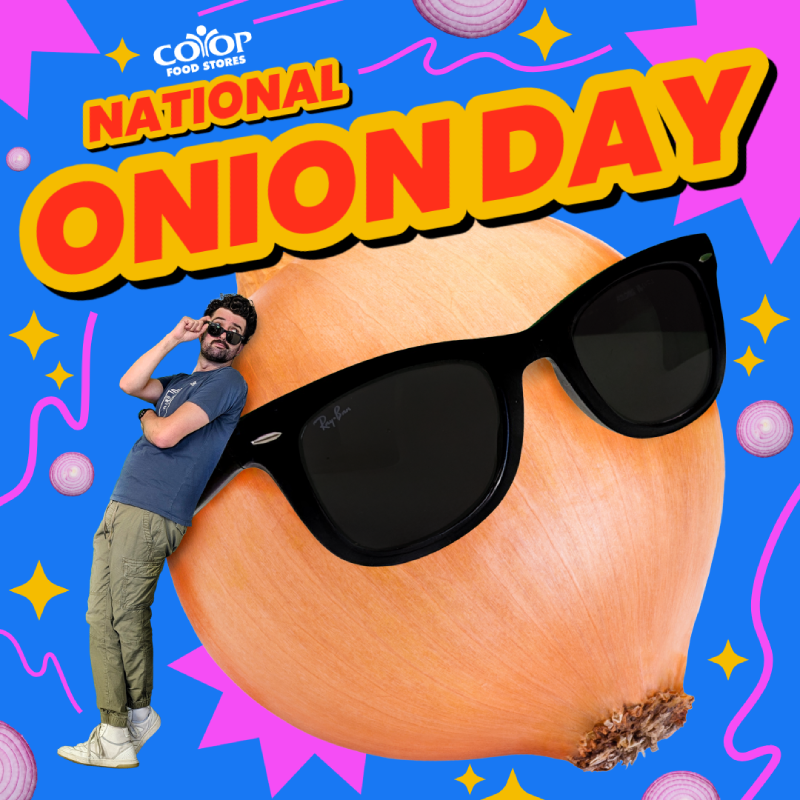
the heroes we need
We're not sure why our social media team turned National Onion Day (last Friday) into an 80s buddy-cop movie aesthetic, but we're here for it.
As the days get longer and we’re enjoying all the fresh produce summer has to offer, it’s easy to forget about some of our pantry heroes. But let’s hear it for the humble onion! This versatile veggie is a cornerstone of many delicious dishes, and knowing how to store them properly now means you’ll have them on hand for all your culinary adventures well into fall.
With this in mind, before you shed a tear over a sprouting bulb, let’s talk about making your onions last.
The Great Onion Escape: How and Where Not to Store These Bodacious Bulbs
First, a few don’ts:
Don’t refrigerate whole onions. Let’s face it, the fridge is a cold, dark, uncaring place, like Danny Glover’s outlook on life in the beginning of Lethal Weapon. Unless the onions have been cut, the cold, humid environment of your fridge will make whole onions soft and moldy faster. Plus, they can impart their strong flavor to other foods. No one wants onion-flavored OJ.
Don’t let ’em shack up with potatoes. This is classic kitchen pairing etiquette. Potatoes release moisture and ethylene gas, which will cause your onions to spoil more quickly. It’s a toxic relationship, and your onions deserve better. A bad roommate situation.
Don’t keep them in sealed plastic bags. Onions are wild and free-spirited, like Don Johnson in Miami Vice, yearning to breathe. Trapped moisture in a sealed plastic bag will lead to rot.
The Ideal Onion Abode: Where They Thrive
For whole, unpeeled onions, think cool, dark, and dry. Here’s the sweet spot:
A cool pantry or cupboard. Aim for temperatures between 45-55°F (7-12°C). Your typical pantry or basement is often perfect.
Good air circulation. A mesh bag, a basket, or even an open bowl works wonderfully. The key is airflow to prevent moisture buildup.
Away from direct sunlight. Light can increase temperature and humidity, leading to spoilage.
When stored correctly, most whole onions can last anywhere from 2 to 3 months, sometimes even longer! That means you can stock up now and enjoy them for your autumn soups, stews, and roasts.
What About Cut Onions?
Once you’ve sliced or diced an onion, it’s a different story. Wrap them tightly in plastic wrap or store them in an airtight container in the refrigerator. They’ll stay fresh for about 7-10 days. They’re perfect for meal prep to save you time during busy weeknights when you’re planning a Beverly Hills Cop marathon.
Fun Onion Facts to Impress Your Friends
Trust us, your friends and family are just itching to increase their knowledge of onionlore. Here are some interesting tidbits:
- Did you know onions are one of the oldest cultivated vegetables? They’ve been enjoyed for thousands of years.
- The chemical compound that makes us cry when cutting onions is called syn-propanethial-S-oxide. Chilling your onions before cutting, or cutting them under running water, can help reduce the tears.
- There are hundreds of varieties of onions, ranging from sweet and mild to pungent and spicy. Each one brings its own unique flavor profile to your cooking.
- Onions aren’t tuberous root vegetables, and don’t wanna be. While onions grow underground and are often grouped with root vegetables like carrots or radishes culinarily, botanically speaking, an onion is a bulb. Bulbs are basically modified stems, and an onion is a type of underground stem structure that has been modified to store food. The fleshy layers you eat are actually enlarged, fleshy leaves compressed into tight layers.
So, next time you grab an onion from your pantry, give it a little nod of appreciation. This unsung hero is ready to add depth, flavor, and a little bit of magic to your meals, no matter the season.
Ken Davis is a senior writer for the Co-op.

